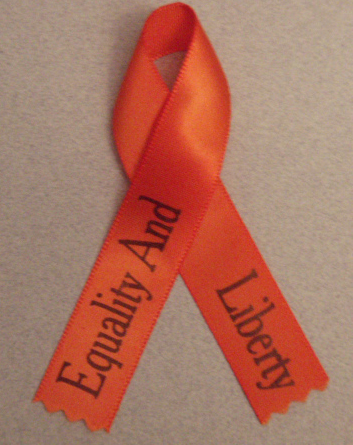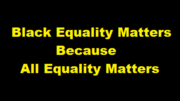Can we pursue equality in human rights, if such equality is only for selected identity groups? Have we succeeded in our commitment to equality only once the identity group we support wins power in the conflicts we are deeply concerned about? While the answer may seem obvious in theory, in practice, we can find some individuals and organizations holding a very different point of view.
— Conflicts and Winning. In conflicts, we see ourselves and others often taking sides with one group, one argument, one position, over another. The challenge is when our positioning in conflicts leads to essentialism of other identity groups. We also see such conflicts focusing on who has “power.” If the individual, group, or ideology we support has “power,” then world affairs seem to be fair, if not then they are unjust. The issue of equality can get lost in the struggle and the debate over these conflicts.
— Equality and Winning in Life. But equality is more than simply who wins in individual conflicts. A commitment to human equality in human rights and dignity is essential to win in life itself. A commitment to human equality is in any long-term peace, progress, and our ongoing necessary relationships with our brothers and sisters in humanity.
— Is Inequality Only an Extremist View? As I have previously pointed out, a number of extreme groups that reject shared human rights also reject human equality in rights and dignity. Their extreme views can often be readily viewed as objectionable by others. But the truth of human equality is not just a challenge for extremist organizations. Human equality is also a truth that cannot be denied by any of us.
— Essentialism Rejects Equality. One challenge to human equality is the concept of essentialism. Those who hold essentialist perspectives believe that various identity groups must inherently behave in certain ways or have certain characteristics. Essentialist thinking believes that people of a certain race, religion, nationality, ethnic group, gender, sexual orientation, or other identity group predominantly have certain characteristics or behaviors that define their identity group. Essentialism generalizes these identity groups and sets expectations for interactions, roles, and world views of such identity groups. Those who support essentialism find such generalizations convenient to set expectations as to what to expect from various identity groups. Essentialists can even believe that their generalizations help them define the proper role and responsibility for members of these identity groups in human society.
— Possibilities, Not Limitations. Based on their generalizations, essentialists view humanity by their perception of its limitations, not by its possibilities. Many seek change. But if we define identity groups by essentialist limitations, can we truly recognize the possibilities for human change and growth? We may see groups of individuals and even large numbers, mobs, within an identity group performing certain actions or having certain shared views. This gives confidence to those who demand that we focus on the limitations of our fellow human beings. But the reality is that even such large numbers within an identity group are still a subset of the identity group itself. They are not EVERYONE in the identity group, as the essentialist argument would like us to believe. We often state how we seek change in society. We cannot work toward lasting change for peace and progress if our society focuses on condemning identity groups, based on their perception or based on the actions of some members of that identity group. We must look for the vistas of opportunity, not the walls of division.
— Generalizations, Not Responsibilities. The essentialist’s general arguments against identity groups also reject individual responsibility for both their identity group and other identity groups. They can view those members of their own identity group “can do no wrong” and they can view that members of another identity group “can do no right.” This is too common in groups involved in social conflict. They feel the need to take the side of their group, rather than to hold individuals accountable for their actions. This prevents some from being able to be critical of individual behavior of some members of such groups. Ironically, this reinforces the very essentialist argument that claims members of an identity group all have the same behavior, which rationalizes discrimination, oppression, even violence against that group. In striving for human equality in human rights and dignity, we are all accountable for our actions. We must not encourage essentialist thinking by failing to have the courage to speak out on our individual responsibilities, and we must recognize our own faults as well. As human beings, we also have human failings and mistakes that we make. Unlike the essentialist view, we must recognize that we can change and we can offer diversity in our beliefs.
— Is Essentialism Benign? The description of essentialist thinking may sound relatively benign. After all, some might argue, don’t we all have the need to generalize about things? Some may also view essentialism as politically expedient. It is simpler to label all members of an opposing group in a conflict in de-humanizing terms, and that view them as incapable of human change and growth. Some may even such essentialism as valuable in helping to “simplify” the debates or view of groups. They may argue that essentialism can be benign, helpful, or even politically strategic. This is not the argument that supports human equality and dignity. Human equality is not for some people. Human equality is for all people.
— Essentialism and De-Humanizing. When we feel compelled to assign essential attributes to an identity group, we DE-HUMANIZE the members of that identity group as individual human beings. They are no longer people. They are labels. From that, the labels become targets for categorization and criticism. It is easy much easier to compare labels then people. We compare labels all the time, when we buy food. We may not see what the label says than to look inside the box. We are busy people. We need to look at the label, make an instant decision, and act. Is this how we should assess the value and worth of our brothers and sisters in humanity? Certainly, we must reject essentialism if we seek to promote human rights and dignity as the inherent for every human INDIVIDUAL.
— The Path from Essentialism to Superiority. History has shown us repeatedly where the path from essentialism can lead. Too often the perspectives and arguments of essentialism then lead towards labels of identity groups, which argue that some identity groups (typically ours) are superior to others. Some may claim that such views of superiority are also harmless. They may argue that it is right to recognize such superiority of an individual identity group so that the group has a rightful leadership role, community role, social role, or even family role. They may argue that it is necessary to recognize that such superiority may even be necessary to “help” other “inferior” identity groups, whose it is viewed will have nothing but pitiful failures if the “superior” group does not show them the proper way to live behave, conduct themselves in life, for our view of progress. I remain shocked how often I hear publicly state the superiority of their identity group over others. They have de-humanized the labels of the other identity group; they have no compunction, no sense of shame or embarrassment towards their claims of superiority over the other identity group, which of course, is comprised of INDIVIDUALS – other brothers and sisters in humanity.
— Superior by Nature. The argument is also frequently advanced by IQ analysts and other “scientists,” by reportedly “scientific studies,” and the like that they can “prove” the superiority of various identity groups by elements in nature. There are those who will use such “scientific” essentialist arguments to demonstrate their “proof” that certain identity groups will predictably act in a certain way, therefore, they conclude, it must be “natural” for them to do so. These frightening arguments by would-be white coats and “scholars” often seek to rationalize superiority of some over others. But these scientific and statistical views fail to recognize our common bonds as brothers and sisters in humanity, the shared world we live in, our common physiology, and our common needs for all of the elements of life, love, and happiness. Some have also provided an extreme focus on the difference between men and women, based on our limited physical difference. Their argument against is that only nature defines us, and that nature defines the superiority of one over another. We are all human beings. We are compassionate, cruel, happy, sad, strong, weak, all at the same time. No one wins by one group being “better” than the other. Human society wins by respecting our EQUAL and shared human rights and human dignity together. Our nature is our shared humanity. Our science must be the way that we can work TOGETHER to respect our individual differences to see our many possibilities.
— The Path from Essentialism to Superiority to Supremacism. We already know where this leads. Too many want to ignore it. They want to live in denial that essentialism and superiority are elements of our lives that we can use “strategically,” that “help others,” that can be “benign,” that are necessary for a cohesive society, and that are necessary for recognizing reality in the world. (Each argument keeps digging the hole of inequality deeper and deeper.) But once we allow ourselves to accept essentialism and the only view the labels of individual identity groups, and once we can view such labels with smug contempt and disdain of our perceived superiority, the rest of the path is a shorter walk. How do you think slave owners viewed slaves? How do you think Nazis viewed Jews? How do you think extremist oppressors in any identity group, at any time in the world got to supremacist roles? They rationalized their supremacism, step by troubled step, using the arguments of essentialism and superiority. Their supremacism was necessary, after all, they argued, for the survival of their own identity group. Their supremacism was a contribution to larger society itself, by ridding itself, oppressing, or putting in bondage – the other identity group. The supremacists argued then (and they also argue now) that their supremacism is not only good, but also that it is an important necessity for the proper functioning of society (based on their view). So now let us look to see where the path of essentialism, superiority, and supremacism leads: slavery, Jim Crow laws, the Holocaust, political prison camps, even genocide. All of those started with essentialist thinking that an individual identity group is inherently only capable of one type of behavior, role, or characteristics in society. All of them began with the idea that our brothers and sisters in humanity are labels, not individual human beings that love, live, and hope just as we do.
— A Choice. We have the choice when we face essentialist behavior in ourselves and others. We can look the other way, or we can urge them to consider the importance of respecting individual humanity. It is often an uncomfortable choice, and one that we would prefer not to have when it comes to comments by those we respect and that we meet. It is often an uncomfortable choice, when it comes to those who we believe have “good intentions.” But good intentions and our social cohesion cannot be realized if we allow the disease of essentialist thinking to go without challenge. We must urge those who promote essentialist views to respect the individuality of other brothers and sisters in humanity, and ask them to offer an outstretched hand, not an upraised fist to all of them, even those with whom they disagree. Our greatest act of love for our fellow human beings is to respect them as individuals, unique, and with vistas of opportunities in their lives – and in ours.
Choose Love.

